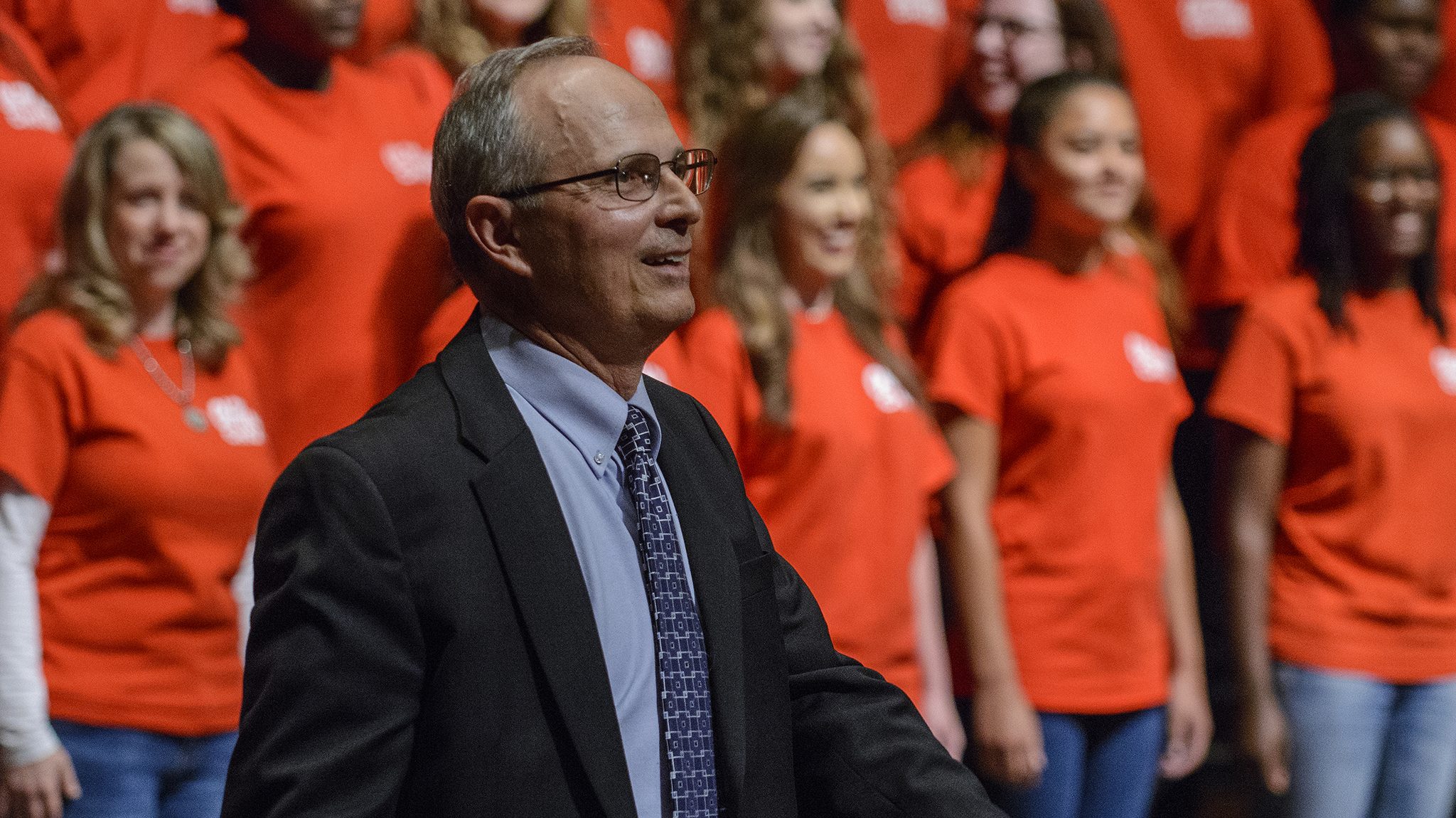
Donald Trott is sharing a career’s worth of experience in his new book, ‘Conducting Men’s Choirs.’ Photo by Marlee Crawford/Ole Miss Digital Imaging Services
OXFORD, Miss. – Donald Trott’s new book is full of information and resources, and his ability to curate and share it results from his long career directing choirs of all kinds. It’s wisdom he wishes he’d had in his early years.
“The idea for this book has been there awhile,” said Trott, professor of music and director of choral activities at the University of Mississippi. In 2012, Trott’s former music department colleague Debra Spurgeon published “Conducting Women’s Choirs” (GIA Publications), and Trott created “Conducting Men’s Choirs” as its companion.
Trott knew there was a need for this kind of resource.
“The book contains the history, the how to do it and the repertoire, written by people who are authorities by virtue of their specific experience,” he said.
The first section of the book examines history and role of men’s choirs.
“A lot of men’s choir singing in the U.S. is grounded in collegiate singing and military choirs – it’s a long, established tradition,” Trott said. “The Harvard Glee Club, for example, goes back to the 1800s, and military choirs have been around as long as the country. But it’s a story that hasn’t been told.”
Allen Crowell’s chapter on the Army Chorus, for example, describes a moment that demonstrates the impact music can have. For a performance at the signing of the Camp David Peace Accords between Anwar Sadat of Egypt and Menachem Begin of Israel in 1979, Crowell had asked the choir’s talented arranger, Jim Kessler, to track down some music that would have meaning for both leaders, and that celebrated peace.
“He found exactly that,” Crowell wrote. Kessler wove together an Arabic chant and text from an Israeli folk song into one composition, alternating back-and-forth between the two languages.
During the performance, Crowell, who was conducting with his back to the audience, noticed that most of the chorus had stopped looking at him.
Afterward, they told him that as they sang the combined song about peace, “President Sadat stood up, walked behind President Carter and gave Prime Minister Begin a big hug,” he wrote. “It certainly underlines the awesome power of music in our lives.”
Two chapters were contributed by Ole Miss personnel.
Jos Milton, UM associate professor of voice, contributed a chapter examining the role of professional male choirs. “They’re an important part of the choral landscape, a real option for how a singer can make a living,” Trott said.
Milton agreed: “The professional choral circuit is an increasingly viable choice for young professional singers. People who are pursuing careers as performers today need to think outside the box a little bit.
“When I was in school, you would train and have dreams of singing on major opera stages. But now, professional choirs are increasingly attractive to singers who are soloists in their own right, but who see the possibilities of coming together to create high-quality chamber music.”
All-male vocal ensembles have many unique qualities that distinguish them from mixed-voice choirs, and that makes Trott’s book even more important, Milton said.
“Vocal techniques particular to male voices, composing/arranging for male choirs, even cultivating young voices – these are all addressed in Don’s book, and it will be an important contribution to the field,” he said.
The second section of the book, dedicated to the particularities of working with male voices, includes chapters on achieving certain sound quality, ideas for formations and warm-ups, composing and arranging, advice from a woman who conducts male choirs, and recruiting young boys to sing.
“It all starts there,” Trott said. “Anything we can do to get boys to sing, we’ve got to do.”
Brady Bramlett, associate director of annual giving for University Development, addresses this issue in his chapter about balancing choir with baseball. Bramlett, an alumnus of the Department of Music, was a successful baseball pitcher in high school and during his Ole Miss student days, and he also managed to perform at a high level with the Ole Miss Concert Singers.
“Don’t let your passion escape you because you think you have to choose two different paths,” he advised. Calling the process of preparing for a musical performance and that of preparing for a game “parallel,” he wrote: “The process may be physically different, but the mental game is the same. Game day, performance day, the adrenaline rush is identical.”
Bramlett credits Trott with seeing that he could achieve in both areas. “He understood what it meant for me to sing and play the sport I love, and he understood I could do both.”
For his part, Trott said that, “Brady’s story is one we need to hear more about and learn from.”
Trott says he selected contributors at various stages of their careers, from retired people at the top of their field to exceptionally talented young conductors just starting out, for a specific reason.
“I want to provide the opportunity for young conductors to see themselves in these pages – where they are and where they’d like to go.”
The book’s final section is one of its most valuable assets: six chapters on repertoire for male choirs from different eras and for different ages. Trott himself authored a chapter on resources and selected repertoire suitable for tenor/bass choruses.
“‘Conducting Men’s Choirs’ will be extremely useful to all conductors who lead men’s choirs,” Milton predicted.
With all the voices and stories in this book, it also makes an interesting read for the rest of us.
